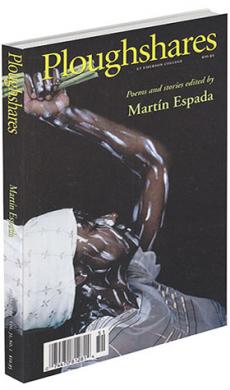Introduction
I began editing this issue of Ploughshares in the summer of 2004 shortly after my return from Chile, where I was invited, with Yusef Komunyakaa and Nathalie Handal, to participate in the celebration of the Neruda Centenary.
We had entered the Republic of Poetry. Restaurants used Neruda’s odes for recipes, and proudly announced this fact on the menu. Radio call-in shows debated the merits of political poetry versus love poetry. There were séances to communicate with poet-spirits. A group of young poets, called Casagrande, who once rented a helicopter and bombarded the national palace in Santiago with poems on bookmarks, was plotting to commit the same act in Guernica. A security guard at the Santiago airport discovered that I was a poet and wouldn’t let me through the line until I recited a poem for her.
Most tellingly, the families of the disappeared—those imprisoned and murdered by the Pinochet regime—staged a demonstration at Neruda’s tomb in the midst of the celebration, demanding to know the fate of their loved ones and calling for the killers to be punished. Of course they should bring their appeal for justice to the grave of a poet. For these citizens of the Republic of Poetry, it made perfect sense.
In October, I visited Walt Whitman’s house in Camden, New Jersey. Whitman was Neruda’s poetic father, and mine, too. Pablo would have been shocked. Compared to Neruda’s house at Isla Negra—an astonishing museum and a national treasure—Whitman’s house is spare and solitary, overlooking a prison across the street. On this day, five people trailed behind a tour guide who seemed more preoccupied with Whitman’s chairs than the poet himself. The priorities of the two governments, and the two cultures, were starkly illustrated.
Yet we are also a republic of poets, and a nation of storytellers. In this age of the illiterate presidency, there is an increasingly urgent need for expression through the written word. There are more good poems and stories being produced, and consumed—nay, devoured—in this country than ever before. If this is a funeral, then it’s a jazz funeral.
This issue of Ploughshares is proof. The writers in these pages not only demonstrate the health of their craft; they also create a record of their times. Their language is powerful precisely because it is not the language of power. Phrases such as "weapons of mass destruction," and their devious uses by our government to rationalize war, bleed language of its meaning. The poems and stories herein restore the blood to words.
Thus, the writers speak against the war in Iraq, but ultimately against war and occupation everywhere: in Palestine, Viet Nam, Korea, and the world. The writers protest against the violations of human decency in the cells of Abu Ghraib, but also recall the disappeared of Chile and a lynching victim in Mississippi. The writers confront authority in the form of the military and the police, but also in the form of violence in the family. The writers deal with poverty from the streets of contemporary Paris to the New Hampshire countryside in the Depression. Whitman’s prisoners and slaves populate these pages; the writers accept the responsibility of making the invisible visible.
There are other eternal struggles here: against time, illness, aging, death. There are countless absurdities that catch the eye: a brawl over a chess match, the journeys of a giant cheese, the haggling over an apartment ruined in the wake of 9/11, vomit on the shoes of a minor television celebrity.
At the same time, these writers find so much to praise. There are two odes from Neruda himself, marking the occasion of his centenary, to the eye and to the elephant, respectively. There are praise-poems for the guitar, a mortar and pestle, a mockingbird, a young couple in the grass, a singing father, a beloved poet, strange and beautiful words. The writers love the same world that causes them so much grief.
This is the world I collected in a big cardboard box that I dragged from room to room for months. I read manuscripts through October and watched the Red Sox stage their stirring comeback against the Yankees to take the American League pennant, then stampede the Cardinals to win their first World Series since 1918. Here, after eighty-six years, after the miraculous defeat of an aristocratic and arrogant tormentor, was something like justice. If the Red Sox could vanquish the Yankees and go on to win the World Series, could other dreams deferred be far off?
At a breakfast joint in Boston where I waited for the Red Sox victory parade to begin, I encountered a waitress from Ireland dressed in a Manny Ramirez jersey. At the table everyone talked about the Red Sox as metaphor, representing the infinite possibilities of change for the good. "Like peace in Ireland," someone said. The waitress shot back: "There will never be peace in Ireland." So much for infinite possibilities.
Indeed, President Bush was reelected soon afterwards. Unlike those who swore they would flee to Canada after this national embarrassment, I calmly decided that I was never leaving my house again. I was left with my cardboard box. I dipped into the box and fished out more metaphors, with gratitude.
Someday, when peace and justice come to Ireland, their poets and storytellers will be there. Neruda wrote during the Spanish Civil War: "The world has changed and my poetry has changed." Indeed, the world has changed many of the writers collected in this issue of Ploughshares; yet, many of these same writers will change the world by changing the people who read them, in ways great and small, profound and subtle.
